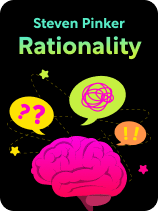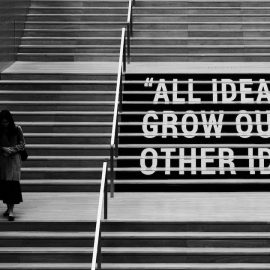

This article is an excerpt from the Shortform book guide to "Rationality" by Steven Pinker. Shortform has the world's best summaries and analyses of books you should be reading.
Like this article? Sign up for a free trial here.
What does it mean to think and behave rationally? What difference does rationality make?
In his book Rationality, Steven Pinker argues that rationality and reason are essential. But, people often misunderstand them and end up acting irrationally even when they think they’re not. Carl Sagan would likely agree with Pinker, although he would come at it from a different angle and context.
Keep reading to learn about the importance of rationality, according to Pinker and Sagan.
The Importance of Rationality
Pinker defines rationality as the use of knowledge to attain goals; a rational person must have a purpose for their thinking, whether that be to get around a physical object or to determine the truth of an idea. Pinker contends that we as humans have a moral obligation to think rationally. He provides two reasons for this and, in doing so, reveals the importance of rationality.
First, rationality is moral because it’s through rationality that we build a better society. Reason has enabled us to make valuable discoveries, inventions, and social progress that have allowed humans to live better lives. Because we have a moral imperative to improve the world and the lives of others, and since rationality is a key aspect of our ability to do so, we have a moral obligation to think rationally.
Second, morality hinges on agreement on right and wrong. Reason allows us to think impartially, consider conflicting interests, and determine what contributes to the common good. Because rationality is the only thing that allows us to come to a collective consensus on anything, it’s the only way to prevent one group from deciding what’s right and forcing their ideas on others, which is inherently immoral.
| Carl Sagan and the Morality of Science Scientist Carl Sagan has also argued that rationality is moral, specifically in terms of how it leads to scientific advancements. In The Demon-Haunted World, he notes that some people consider science immoral because it has led to negative consequences that have decreased the quality of life for many, such as nuclear weapons, climate change, and the adverse effects of technology. However, Sagan argues that the benefits of science to society outweigh these negative outcomes—improvements to agriculture, medicine, and communication, for example, have markedly raised the standard of living for billions of people. So, he believes that adhering to science is moral. Sagan also weighs in on how science can promote ethical thinking in general. He argues that science can counter bigotry and intolerance—for instance, when it dispels racial and misogynistic stereotypes that lie at the basis of much inequality. He also notes, in alignment with Pinker’s argument, that a society that thinks critically can better fight back against misleading propaganda produced by authoritarian governments, which rationality leads to more peaceful, equitable governance. |

———End of Preview———
Like what you just read? Read the rest of the world's best book summary and analysis of Steven Pinker's "Rationality" at Shortform.
Here's what you'll find in our full Rationality summary:
- Why rationality and reason are essential for improving our world and society
- How you can be more rational and make better decisions
- How to avoid the logical fallacies people often fall victim to






